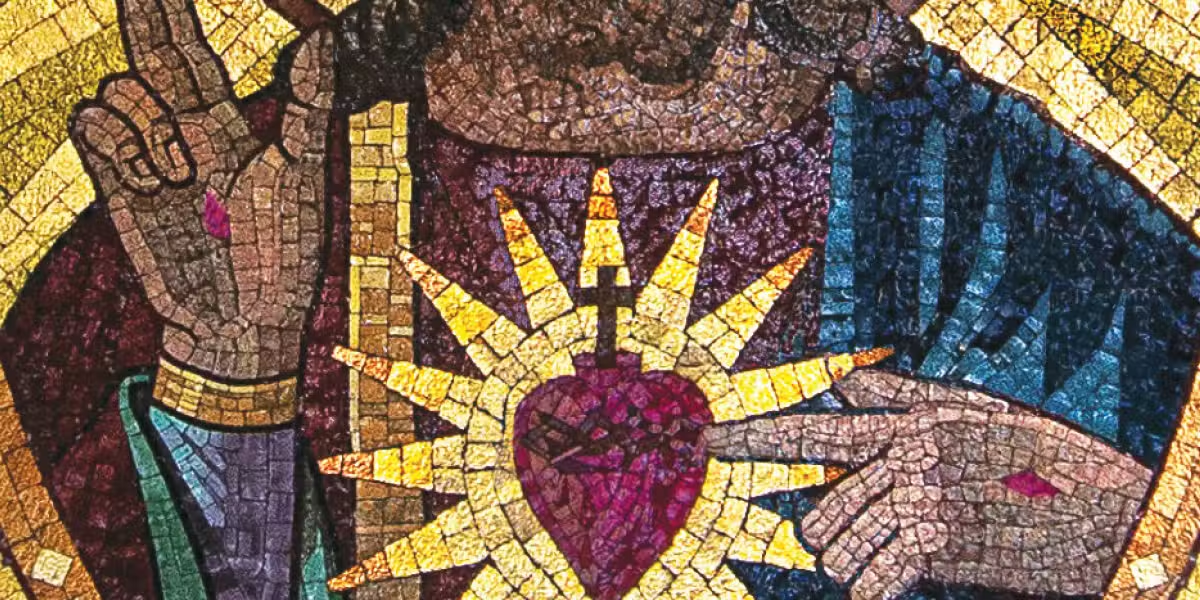He Has Loved Us, Pope Francis’ fourth encyclical, was published during last October’s worldwide Synod of Bishops but did not receive much attention. His death on April 21 and the feast of the Sacred Heart of Jesus (celebrated on June 27 this year) offer good reason to give his life and that text a closer look.
The heart, writes Pope Francis, “usually indicates our true intentions, what we really think, believe, and desire, the ‘secrets’ that we tell no one; in a word, the naked truth about ourselves.” Our fast-paced and technology-driven society easily promotes “an unhealthy individualism.” Although “our real personal history is built with the heart . . . a society dominated by narcissism and self-centeredness will increasingly become ‘heartless.’”
We decide what to do or avoid based on what is in our hearts, which is where Jesus calls us and leads us to a better place. “The cross is Jesus’ most eloquent word of love. [Love is] a word that is not shallow, sentimental, or merely edifying. It is love, sheer love.”
Jesus’ sense of “heart” leads him to embrace the cross, where his side was pierced. The blood and water that flowed out energize and support the missionary vocation of all baptized persons. Between December 1673 and June 1675, Jesus reportedly appeared to St. Margaret Mary Alacoque, encouraging devotion to the Sacred Heart.
What Difference Does This Devotion Make?
Pope Francis summarized the importance of Sacred Heart devotion to several saints and the Jesuits, in general. St. Claude la Colombière, SJ, was St. Margaret’s confessor. This devotion has always had very practical consequences.
“If we believe that grace can bridge every distance,“ writes Pope Francis, “this means that Christ by his sufferings united himself to the sufferings of his disciples in every time and place. In this way, whenever we endure suffering, we can also experience the interior consolation of knowing that Christ suffers with us. In seeking to console him, we will find ourselves consoled.”
Judged by Our Hearts
Our minds collect information that our hearts process. Two individuals seeing the same person in need can respond very differently: The first individual may assume, for example, that this person’s need arises from a personal failing (e.g., substance abuse or gambling too much); the second individual, who sees a person made in God’s image and likeness, chooses to respond compassionately.
When Jesus describes those who will be saved and the ones who will not (Mt 25:31–46), he was describing people who had access to similar information but who processed it very differently. We see the same dynamic in the parable of the good Samaritan (Lk 10:29–37) and the rich man and Lazarus (Lk 16:19–31). The prayer “God, I thank you that I am not like the rest of humanity” (Lk 18:11) came from a self-serving heart, one not radically open to God’s grace.
In Hope: The Autobiography, Pope Francis writes, “We are our hearts because it is that which distinguishes us, which configures us in our spiritual identity, which places us in communion with other people.” He goes on to explain: “The real personal adventure is that which is accomplished from the heart. At the end of life, all that matters will be this.”
Learn more about the Sacred Heart of Jesus here.

Sacred heart Sacred heart Sacred heart

